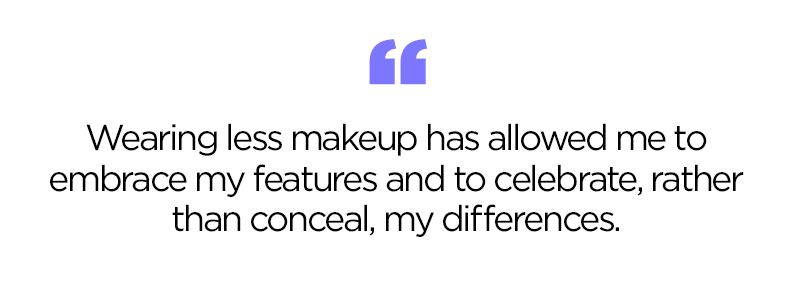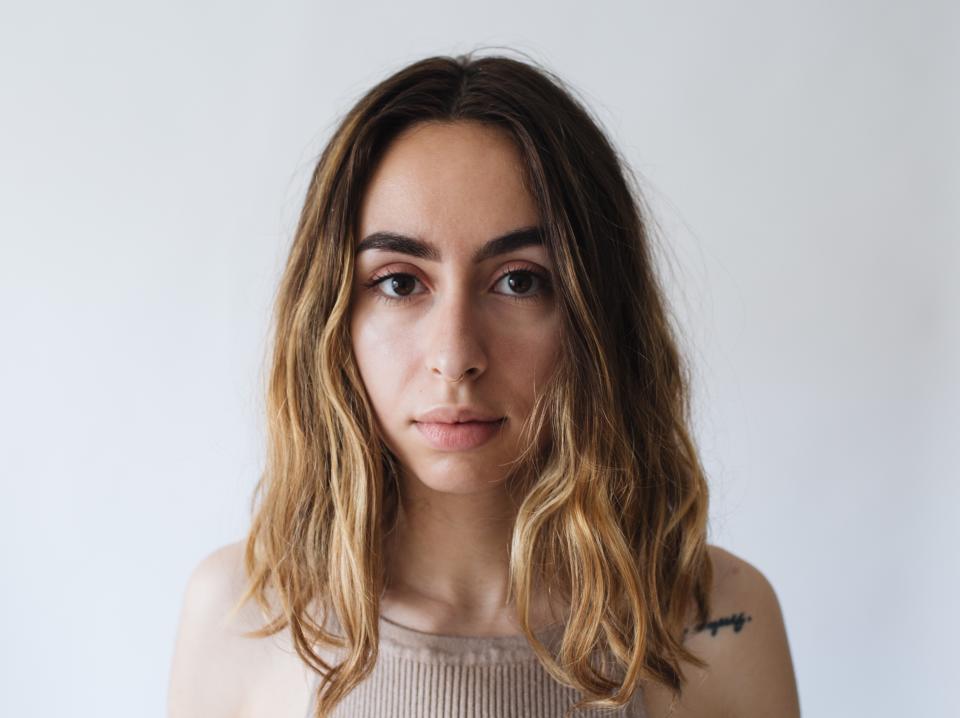Why makeup 'no longer felt like freedom' to me as a Muslim woman in America

“American Beauty” is a new series in which Yahoo Lifestyle takes a virtual cross-country journey to discover what beauty means — reimagining the American flag through the diverse group of faces that make up the United States of America. For our first installment, we’re focusing on Muslim-American women, highlighting what makes this group unique while showcasing the common threads that bring us together. In this first-person essay, Adeline Hocine explains how immigrating to the U.S. at a time when the “height of popular culture was dominated by whiteness” influenced her beauty choices.
When I was 5 years old, my parents immigrated to the U.S. In 1999, we moved to a small, suburban town tucked away in the nondescript Midwest. Arriving at a time when the height of popular culture was dominated by whiteness, I was influenced by a standard of beauty that would never make space for me. Perhaps it is for this reason that I remember so well the blond-haired, blue-eyed girls I was suddenly surrounded by, and am quick to forget everyone else. Their delicate features represented a ubiquitous beauty ideal.
I immediately felt out of place, further magnified by the lack of other Muslims. After 9/11, I was no longer just seen as an outlier, but as a criminal as well. My thick eyebrows, combined with the large, pronounced bridge of my nose, were features shared by the guilty and dangerous. Their crimes were assigned as my own in the process.

In 2006, I started middle school. I plucked my eyebrows for the first time that year. I began with the obvious, plucking the hairs just between my eyebrows. Each pull was accompanied by a sharp pain, a tangible embodiment of my loss, though I don’t think I knew then just what I was losing. I continued, stopping only after my skin began to ache in a dull shade of red, the millimeter-size droplets of blood already drying on my forehead.
I had wanted so badly to believe that change was coming, but the next day at school proved otherwise. I realized then that people’s hatred wasn’t rooted in the way I looked, but in what it represented.
I had read enough fashion magazines to know about plastic surgery, but also to know that such permanence required patience and age. I dreamt of one day waking up with a nose that did not incite questioning, but in the meantime, I craved a temporary solution.

Growing up, I grappled between two cultures. Though their differences often seemed as far apart as the literal distance between them, they both held women to strict beauty ideals. I learned that when framed by thin eyebrows, large eyes possessed the potential to be considered beautiful, whereas my nose, while common back home, could never be in this new environment. Deemed foreign upon entering this country, I was expected to minimize my “exotic” features, viewed by others as flaws.
Makeup had the power to deflect and distract, and I embraced it wholeheartedly.
Blending concealer, foundation, and blush created a cocktail of colors that added years to my face. The guise of maturity allowed me to somehow feel slightly more safe. My eyes were my saving grace, and eye makeup exaggerated them in their sheer expansiveness. Like deep pools with no clear end, I drowned onlookers with my gaze until they forgot that there was any other part of me left to be seen. Lipstick — from the brightest to the deepest shades of red — demanded attention directly from my eyes down to my lips, conveniently overlooking the shape of my nose in the process. I rarely deviated from this formula, the end result always inspired by the few often ethnically ambiguous models gracing the pages of magazines. Inspired, but ill-informed, though that part didn’t matter. After all, this wasn’t for my own comfort, but for theirs.

At first unfamiliar, my hands continued to repeat these motions until they became second nature. I used makeup to transform myself so many times that I could no longer recognize who I was without it. While makeup might have provided an escape, it no longer felt like freedom.
Once enough people had seen me in a full face of makeup, anything less than ignited concern. Depression and illness were somehow always among the first logical assumptions, as though to leave the house bare-faced was to leave everything you ever held close behind. The best version of myself had become tied to a nonexistent ideal, and the daily ritual of applying and subsequently removing this ideal had grown exhausting. I began to approach makeup differently. Rather than masking my differences, I decided to make the most of them.

Now, I no longer butcher my eyebrows, choosing to brush them instead. It has become a lesson in slowing down, a routine in savoring the first new minutes of each morning. There are still days when eye makeup still feels necessary — but in warm, subdued hues of peach and yellow that bring out the gold flecks in my eyes, reminding me of the abundance my ancestors left me. Other days, I choose to bare my soul, the subtle glow of highlighter on an otherwise naked face. Most importantly, I no longer dream of shrinking my nose and no longer worry about the hair on my body, about where it grows or why.

For me, choosing to wear natural makeup is a personal decision, and one born of my own lifelong discomfort with my identity. I was taught that as a Muslim woman, wearing heavy makeup was the only way to feel secure with my “exotic” features. I knew that choosing to wear less makeup would mean challenging a stigmatized, monolithic beauty standard, but I also knew that I needed to find a sense of comfort within myself that did not feel forced.
My features demand space, and natural makeup creates room for them. Wearing less makeup has allowed me to embrace my features and to celebrate, rather than conceal, my differences.
For the first time, I feel unencumbered by my appearance. It simply is.

Read more on Muslim-American women in our American Beauty package:
9 halal beauty brands that prove the Muslim beauty industry is booming
A look at what life is really like for a Muslim high schooler in NYC

